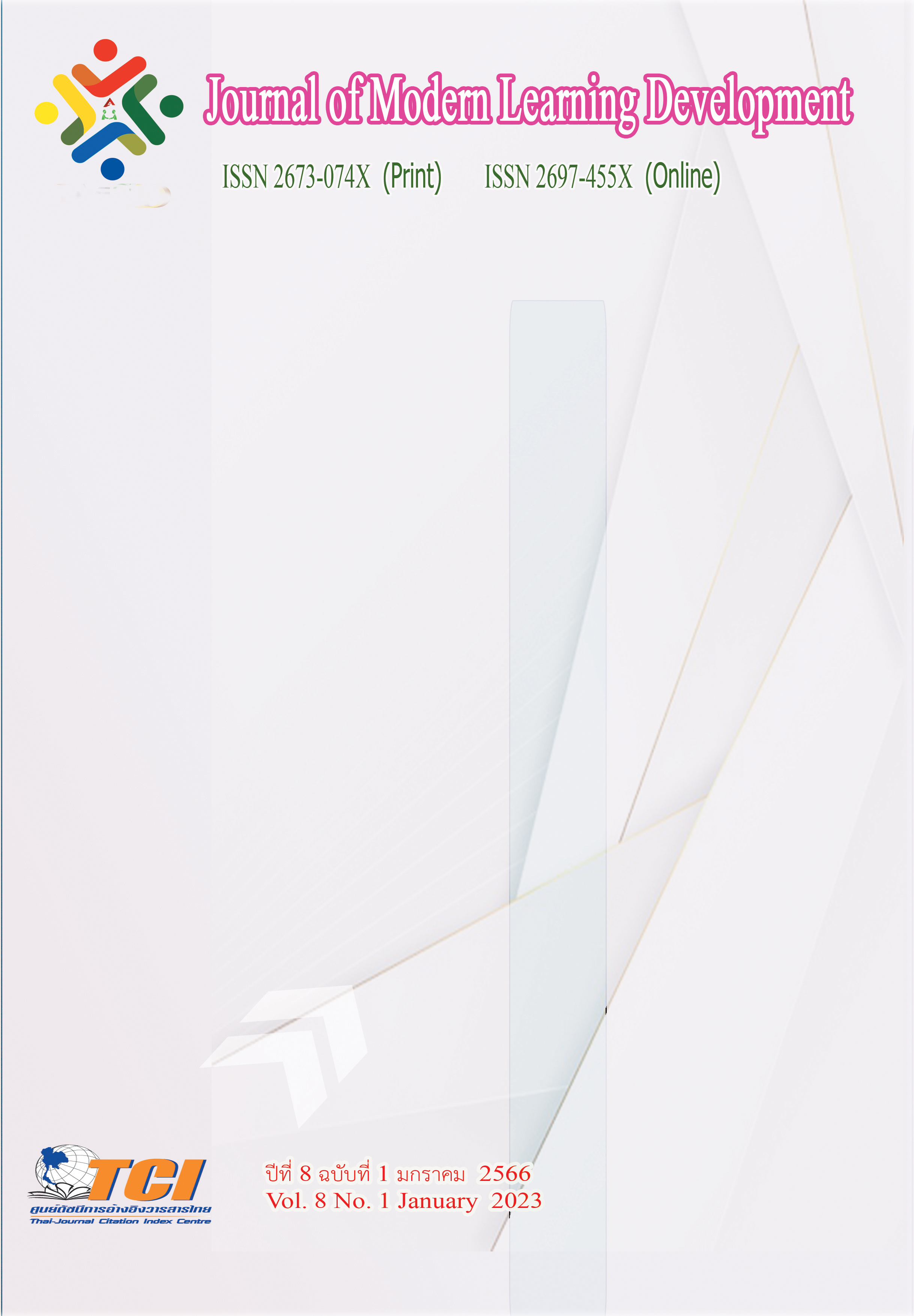Stakeholders-based Evaluation of the Eco-Printing Training Workshop Project
Main Article Content
Abstract
This project evaluation aimed to assess the eco-printing training workshop project by using a stakeholders-based evaluation. It consisted of five steps: 1) identifying and selecting the stakeholders; 2) contacting and discussing with them; 3) collecting and evaluating the data; 4) giving suggestions for report preparation and utilization; and 5) reporting the results.
An interview, a focus group discussion, and a five-point scale questionnaire were used as the research instruments. Mean and standard deviation were used to analyze the quantitative data. Content analysis and presentation in the form of a qutline were used for the qualitative data. The evaluation results were presented in accordance with the evaluating objectives, which were collaboratively developed by the stakeholders in four issues as follows:
1) During the planning and preparation of the training workshop found that the staff participated in planning the training workshop through the consultative meeting, which is an organizational culture or Long Khaek in Thai. Simultaneously, it was found that staff required more budget support to run the workshop effectively. 2) In terms of satisfaction of the participants towards the training workshop’s procedure, it was found that satisfaction towards the contents and the lecturer was at the highest level. The training workshop venue, on the other hand, was determined to be unaccommodating for the participants to practice. 3) Regarding the impact on the participants, the results showed that the majority of the participants did not use the knowledge gained from the training to start a business or enhance their income due to a lack of materials and equipment. However, some could produce pieces of work and turn them into commercial products. In addition, they could impart their knowledge by lecturing and instructing the members of their groups. 4) In terms of the impact on the organization, it was found that the majority of the participants did not know the role of the organization. After participating in the training workshop, on the other hand, they knew the role of the organization. The study also found the relationship between the participants and the training workshop staff on a social networking site, specifically a Line group.
Article Details
References
กิตติทัช เขียวฉอ้อน. (2560). การทำงานเป็นทีมสู่การเพิ่มประสิทธิผลในการทำงาน. วารสารวิทยาลัยดุสิตธานี. 11 (1), 355–370.
จรุณรักษ์ ยี่ภู่. (2551). การประเมินผลโครงการฝึกอบรมการบำบัดฟื้นฟูสมรรถภาพเข้มข้นทางสายใหม่ (FAST Model). สถาบันธัญญารักษ์ กรมการแพทย์ กระทรวงสาธารณสุข.
ธมญย์รัตน์ เจริญรัตน์. (2553). การประเมินโครงการเรียนฟรี เรียนดี อย่างมีคุณภาพของโรงเรียนสังกัดกรุงเทพมหานครในสำนักงานเขตมีนบุรี. ปริญญานิพนธ์วิทยาศาสตร์มหาบัณฑิต. บัณฑิตวิทยาลัย: มหาวิทยาลัยศรีนครินทรวิโรฒ.
นริศรา บุญเที่ยง. (2561). ความพร้อมในการฝึกอบรม กระบวนการฝึกอบรม และความพึงพอใจในการฝึกอบรมที่มีผลต่อแรงจูงใจในการนำการฝึกอบรมไปพัฒนาในการทำงานของพนักงานธนาคารพาณิชย์ในโซนถนนรัชดาภิเษก. การค้นคว้าอิสระบริหารธุรกิจมหาบัณฑิต. บัณฑิตวิทยาลัย: มหาวิทยาลัยกรุงเทพ.
นิตยา วานิชพิพัฒน์. (2556). การประเมินหลักสูตรสื่อสารมวลชนศึกษา โรงเรียนไทยรัฐวิทยา สำนักงานเขตพื้นที่การศึกษาประถมศึกษาจังหวัดเชียงราย. วิทยานิพนธ์ครุศาสตรมหาบัณฑิต: มหาวิทยาลัย ราชภัฏเชียงราย.
รัตนะ บัวสนธ์. (2550). ทิศทางและอาณาบริเวณการประเมิน. (พิมพ์ครั้งที่ 2). กรุงเทพมหานคร: จุฬาลงกรณ์มหาวิทยาลัย.
วาทิต ประสมทรัพย์. (2563). ปัญหาของการประชาสัมพันธ์ภาครัฐและแนวทางแก้ไข. ออนไลน์. สืบค้นเมื่อ 10 พฤษภาคม 2565, แหล่งที่มาhttps://crfmgt.com
Werner, J. M., & DeSimone, R. L. (2011). Human Resource Development. (2nd ed.). Mason,
OH:South-Western Cengage Learning.


